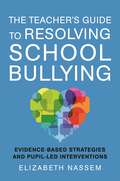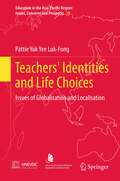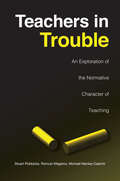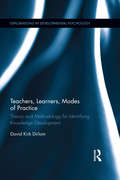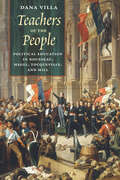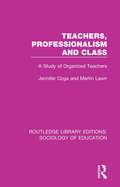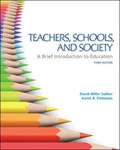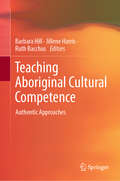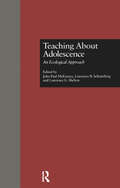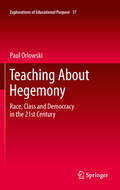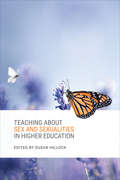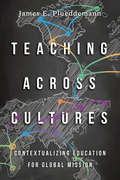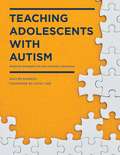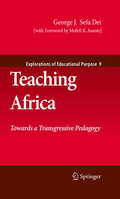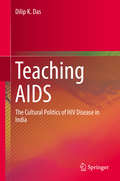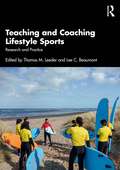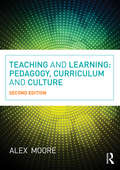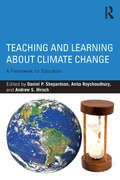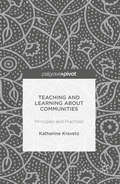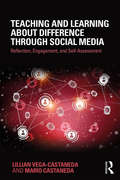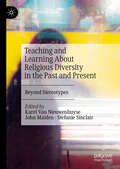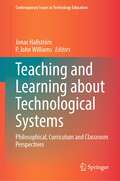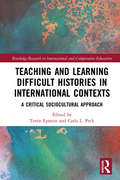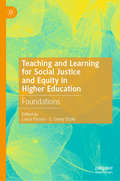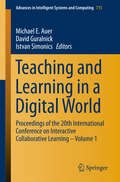- Table View
- List View
The Teacher's Guide to Resolving School Bullying: Evidence-Based Strategies and Pupil-Led Interventions
by Elizabeth NassemDrawing on the author's cutting-edge research this practical book helps teachers better understand the causes of bullying, gives them confidence to resolve nuanced cases, and provides them with the tools to develop pupil-led anti-bullying campaigns. This book delves into the complex nature of bullying at school in a clear and approachable way. It helps school staff understand the student's views and experiences of bullying, and how power imbalances and systemic inequalities can contribute to bullying relationships between pupils. The author provides evidence-based interventions that suggest ways teachers can develop knowledge and skills to resolve incidents. Key to this is a new approach to pupil-led interventions which allows staff to harness pupil voices to develop effective anti-bullying strategies. Included are resources and tools to help teachers set up these advisory groups and interventions, and train others to do the same. This is essential reading for teachers looking for a comprehensive and accessible guide to tackling bullying.
Teachers' Identities and Life Choices
by Pattie Luk-FongThis book discusses issues related to teachers' identities and life choices when globalisation and localisation are enmeshed. It examines how competing cultural traditions and contexts acted as resources or/and constraints in framing teachers' identities and their negotiations in the family and the work domains according to their gender positioning, their roles in the family such as husband, wife, father, mother, brother, sister, son and daughter and roles in the school such as principal, senior teacher or regular teacher. Contrary to an essentialist approach to identity and culture, teachers' stories show that their identities and life choices were hardly free choices; but were often part and parcel of the culture and contexts in which they were embedded. Teachers' identities are found to be fluid, complex, hybrid and multifaceted. Using Hong Kong as a case study, this book provides not only traces of the continuity and changes of Confucian self and cardinal relationships but also a glimpse of how educational reform as neo-capitalist discourses in the workplace interacts with Confucian cultural traditions creating new hybrid practices (problems or possibilities or both) in the school and in the daily lives of teachers.
Teachers in Trouble: An Exploration of the Normative Character of Teaching
by Michael Manley-Casimir Romulo Magsino Stuart PiddockeThe teacher who has an affair with a student. The teacher who is a transvestite. The teacher who advocates personal beliefs. These are 'teachers in trouble.' Their behaviour, whether it occurs in the classroom or off the job, offends the community and brings down censure from the school board.At root, schools are cultural institutions and teaching, a cultural activity. Teachers are expected to shape students according to accepted community norms. They interpret and apply curricula - and can divert curricula from their intended purpose. Teachers are at the eye of the vortex in the struggle for control over education, buffeted by the forces of social change and conflicting public expectations. The authors of this book examine how teacher conduct is monitored and what types of misconduct can produce 'social dramas.' Boards of reference have been established to arbitrate disputes between school boards and teachers who are dismissed. Drawing on the decisions of these boards of reference across Canada, the authors identify normative issues and propose a classification scheme for contentious behaviours.Teachers in Trouble poses fundamental questions about the role of teachers in society. It is an invaluable guide for teachers and professional organizations, education administrators, and members of the community who are concerned about ethics in our schools.
Teachers, Learners, Modes of Practice: Theory and Methodology for Identifying Knowledge Development (Explorations in Developmental Psychology)
by David Kirk DirlamSummarizing a half century of work on the problem of identifying units of analysis for complex human behaviour, this book introduces modes of practice as a unit of analysis for the science and design of human activities, and shows how to record them and create field guides at scales from individual to society. Revealing scientific analysis of human practices has been hampered by the lack of a unit of analysis, Dirlam describes how the difficulties of defining a unit are overcome by combining insights from mathematics and human development. Part II presents methods for developmental surveys and interviews that enable social scientists, designers, and education or training assessment professionals to gather data on modes of practice. Part III provides practical descriptions of how to organize interviews into developmental surveys that can be used by a community. Part IV inspires future advances in research and design. Concrete examples from science, design, and learning assessment are used throughout, and the appendix includes the results of 300 developmental interviews, organized into exploratory descriptions of modes of practice and commitment.
Teachers of the People: Political Education in Rousseau, Hegel, Tocqueville, and Mill
by Dana Villa2016 witnessed an unprecedented shock to political elites in both Europe and America. Populism was on the march, fueled by a substantial ignorance of, or contempt for, the norms, practices, and institutions of liberal democracy. It is not surprising that observers on the left and right have called for renewed efforts at civic education. For liberal democracy to survive, they argue, a form of political education aimed at “the people” is clearly imperative. In Teachers of the People, Dana Villa takes us back to the moment in history when “the people” first appeared on the stage of modern European politics. That moment—the era just before and after the French Revolution—led many major thinkers to celebrate the dawning of a new epoch. Yet these same thinkers also worried intensely about the people’s seemingly evident lack of political knowledge, experience, and judgment. Focusing on Rousseau, Hegel, Tocqueville, and Mill, Villa shows how reformist and progressive sentiments were often undercut by skepticism concerning the political capacity of ordinary people. They therefore felt that “the people” needed to be restrained, educated, and guided—by laws and institutions and a skilled political elite. The result, Villa argues, was less the taming of democracy’s wilder impulses than a pervasive paternalism culminating in new forms of the tutorial state. Ironically, it is the reliance upon the distinction between “teachers” and “taught” in the work of these theorists which generates civic passivity and ignorance. And this, in turn, creates conditions favorable to the emergence of an undemocratic and illiberal populism.
Teachers, Professionalism and Class: A Study of Organized Teachers (Routledge Library Editions: Sociology of Education #42)
by J T Ozga M A LawnFirst published in 1981, this book examines the concept of professionalism in the context of the development of organized teachers. The argument is presented that the concept of professionalism is a complex one and its different meanings must be located within a historical context. Thus, its use as an ideological weapon aimed at controlling teachers must be appreciated, whilst, at the same time, it should be understood as a weapon of self defence for teachers in their struggle against dilution.
Teachers, Schools, And Society: A Brief Introduction To Education
by David M. Sadker Karen ZittlemanDavid Sadker's and Karen Zittleman's lively writing style captures the joys and challenges of teaching. The text stresses the importance of fairness and justice in school and society, focuses on the most crucial topic areas, and integrates the most current issues in education. In addition, the wealth of activities included--from online video observations to portfolio-building exercises--offers a broad range of ways to introduce students to the teaching profession.
Teaching Aboriginal Cultural Competence: Authentic Approaches
by Barbara Hill Jillene Harris Ruth BacchusThis book examines a collaborative partnership model between academia and Indigenous peoples, the goal of which is to integrate Indigenous perspectives into the curriculum. It demonstrates how the authentic and creative approaches employed have led to an evolution of curriculum and pedagogy that facilitates cultural competence among Australian graduate and undergraduate students. The book pursues an interdisciplinary approach based on highly practical examples, exemplars and methods that are currently being used to teach in this area. It focuses on facilitating student acquisition of knowledge, understanding, attitudes and skills, following Charles Sturt University’s Cultural Competence Pedagogical Framework. Further, it provides insights into the use of reflective practice in this context, and practical ideas on embedding content and sharing practices, highlighting examples of potential “ways forward,” both nationally and globally.
Teaching About Adolescence: An Ecological Approach (MSU Series on Children, Youth and Families)
by John McKinney Lawrence Shelton Lawrence ShiambergFor this volume, Professors McKinney, Schiamberg, and Shelton assembled contributors to write about something that is written about far too infrequently: How to present scientific research on adolescent development in ways students find interesting, believable, relevant, and worth remembering when the term is over. Graduate education in adolescent development almost always guarantees adequate training in research and theory, but training in creative pedagogy is more often than not left to chance. Those of us who teach adolescence regularly know that colleagues all over the world use innovative approaches to take advantage of the real-world relevance of the material, but most of these approaches remain insiders’ tricks of the trade. Teaching About Adolescence is, to my knowledge, the first volume that describes and explains how—and, more importantly, why—the best teachers of adolescence do what they do. It is a much needed book. But this book is much more than a collection of recipes for interesting class exercises or term projects. First published in 1999. Routledge is an imprint of Taylor & Francis, an informa company.
Teaching About Hegemony
by Paul OrlowskiPolitical progressives in Canada and the United States are deeply concerned by the manner in which their countries treat their poor. They are dismayed at the dismantling of the social welfare state, the weakening of public education systems and the grotesque and ever-growing inequality of wealth. To remedy this problem, citizens need to be more aware of how political ideology influences attitudes and actions, and they need to better comprehend the effects of hegemonic discourses in the corporate media and school curriculum. This book informs educators how to develop context-specific pedagogy that will help achieve a more enlightened citizenry and, as a result, a stronger democracy. Teaching about Hegemony: Race, Class and Democracy in the 21st Century promotes a progressive agenda for teaching that is rooted in critical pedagogy, it explains why ideological critique is necessary in raising political consciousness, it deconstructs white, middle-class hegemony in the formal school curriculum, and it examines corporate media and school curriculum as hegemonic devices. It also covers recent theory and research about race, class and democracy and how best to teach about these topics. Combining theory and sociological research with pedagogical approaches and classroom narratives, this book is fundamental for progressive educators interested in developing a politically conscious, progressive and active citizenry hungry for a stronger civil society.
Teaching about Sex and Sexualities in Higher Education
by Susan HillockTeaching about Sex and Sexualities in Higher Education argues that much more can be done in teaching about sex and sexuality in higher education. This edited collection provides key information on professional training and support, and acts as a crucial resource on sex, sexuality, and related issues. With a focus on diversity, this book features expert contributors who discuss key concepts, debates, and current issues across disciplines to help educators improve curriculum content. This collection aims to provide adequate and appropriate sex education training and opportunities to educators so that they may explore complex personal and emotional issues, build skills, and develop the confidence necessary to help others in their respective fields.
Teaching Across Cultures: Contextualizing Education for Global Mission
by James E. PlueddemannIn our globalized world, educators often struggle to adapt to the contexts of diverse learners. In this practical resource, educator and missiologist James Plueddemann offers field-tested insights for teaching across cultural differences. He unpacks how different cultural dynamics may inhibit learning and offers a framework for integrating conceptual ideas into practical experience.
Teaching Adolescents with Autism: Practical Strategies for the Inclusive Classroom
by Walter KaweskiAward-winning educator Walter Kaweski offers secondary teachers practical strategies and heartfelt insights based on his extensive experience as an autism specialist, inclusion coordinator, and father of a son with Asperger syndrome. Students with special needs often require extra support as they adjust to middle and high school and the changes that accompany adolescence. Without support, this time can be overwhelming. Teaching Adolescents with Autism offers hundreds of valuable ideas to help teachers: Understand the causes and manifestations of autism Solve adolescent behavior challenges Support students with diverse needs Implement academic and behavioral interventions Help students adjust to social situations Understand special education policyEach chapter offers numerous personal stories that illustrate and reinforce strategies in a tangible way. Important concepts are augmented with bulleted lists, tables, figures, photographs, and cartoons drawn by a student with autism. This unique book takes the mystery out of teaching adolescents with autism and inspires teachers to appreciate the individuality of each student.
Teaching Africa
by George J. Sefa DeiWritten from the perspective of a knowledge base and educational practice that are both African-centred, this volume uses a discursive pedagogy that is anti-colonial in origin. It theorizes colonial - and re-colonial - relations and the implications of imperial structures on knowledge production and use; the understanding of indigenousness; and the pursuit of agency, resistance and subjective politics. Using a refined definition of colonial, less as 'foreign' or 'alien' but more 'imposed and dominating', the author shows us how colonialism is domesticated and how those who have been oppressed by dominant/hegemonic discourses may find it difficult to step out of them, let alone challenge or resist them. The book is a call for a critical interrogation of dominant knowledge about Africa in order to help the contemporary learner come to grips with the challenges and possibilities of knowing about the African world and the African human condition. The author's anti-colonial discursive platform addresses distorted Eurocentric views of Africa, raises ontological and epistemological questions about teaching methods and methodologies relating to Africa, and highlights knowledge indigenous to Africa. At the same time, it shows what the rest of the world can learn from this knowledge.
Teaching AIDS: The Cultural Politics of HIV Disease in India
by Dilip K. DasThis book approaches the subject of AIDS pedagogy by analysing the complex links between representation or discourse, ideology, power relations and practices of self, understood from the perspective of embodiment. While there is a fairly large amount of literature available on the social, economic, psychological and policy dimensions of the epidemic, there is virtually nothing on its cultural politics. As a critique of the national AIDS pedagogy, this book attempts to fill the gap. It addresses important issues in cultural studies, body studies, medical humanities, disease control policy and behaviour change communication strategies. This book will be of interest to researchers and students of culture studies and social sciences, especially social anthropology, community health, health management. and gender studies.
Teaching and Coaching Lifestyle Sports: Research and Practice
by Thomas M. Leeder Lee C. BeaumontLifestyle sports have witnessed unprecedented growth in recent years, with it being accepted that these activities can contribute significantly to national sport and physical activity agendas, appeal to contemporary youth culture, and provide an alternative to mainstream achievement sports within school physical education. However, this popularity has led to increased professionalisation and institutionalisation, meaning there is now a demand for educated teachers and coaches to facilitate learning through effective pedagogical approaches. Consequently, Teaching and Coaching Lifestyle Sports: Research and Practice is the first book of its kind to provide both theoretical and empirical insights into the process and practice of teaching and coaching lifestyle sports across school, community, and high-performance sport contexts.Drawing upon a variety of lifestyle sports including skateboarding, freestyle BMX, parkour, and freeskiing, this book develops readers’ understanding and conceptualisation of the issues, challenges, and opportunities associated with teaching and coaching lifestyle sports. Each chapter, grouped via a broad focus on either teaching or coaching, offers novel perspectives towards current trends, pedagogical approaches, and ‘steps forward’ in relation to lifestyle sports within physical education and sport coaching. This book covers contemporary and important topics within lifestyle sports, such as coach development, enhancing youth sport participation, facilitating athlete learning, and creating a ‘meaningful’ physical education experience. Drawing upon global examples, each chapter generates new knowledge associated with the teaching and coaching of lifestyle sports, while critically discussing areas for future research alongside practical implications for teachers, coaches, and sports organisations. Teaching and Coaching Lifestyle Sports: Research and Practice is a valuable resource for researchers and academics, in addition to students and practitioners, who are currently working across the overlapping fields of physical education, sport coaching, sport development, and leisure studies, or have an interest in lifestyle sports.
Teaching and Learning: Pedagogy, Curriculum and Culture (Itt Ser.)
by Alex MooreTeaching and Learning: Pedagogy, Curriculum and Culture is designed to share important theory with readers in an accessible but sophisticated way. It offers an overview of the key issues and dominant theories of teaching and learning as they impact upon the practice of education professionals in the classroom. This second edition has been updated to take account of significant changes in the field; young people’s use of digital technologies, the increasing involvement of world of business in state education, and ongoing high-profile debates about assessment, to name but a few. It examines the global move from traditional subject-and-knowledge based curricula towards skills and problem-solving and discusses how the emphasis on education for citizenship has forced us to reconsider the social functions of education. Central topics also covered include: an assessment of the most influential theorists of learning and teaching the ways in which public educational policy impinges on local practice the nature and role of language and culture in formal educational settings an assessment of different models of 'good teaching' alternative models of curriculum and pedagogy. With questions, points for consideration and ideas for further reading and research throughout, this book delivers discussion and analysis designed to support understanding of classroom interactions and to contribute to improved practice. It will be essential reading for all student teachers, those engaged in professional development, and Education Studies students.
Teaching and Learning about Climate Change: A Framework for Educators
by Daniel P. Shepardson, Anita Roychoudhury and Andrew S. HirschResponding to the issues and challenges of teaching and learning about climate change from a science education-based perspective, this book is designed to serve as an aid for educators as they strive to incorporate the topic into their classes. The unique discussion of these issues is drawn from the perspectives of leading and international scholars in the field. The book is structured around three themes: theoretical, philosophical, and conceptual frameworks for climate change education and research; research on teaching and learning about global warming and climate change; and approaches to professional development and classroom practice.
Teaching and Learning About Communities
by Katharine KravetzThis book provides a rationale and conceptual framework for teaching and learning about community. It focuses on what community means in multiple contexts, outlines the needs and assets of communities, and discusses different approaches to community change. The book provides real life examples of integrated approaches to community transformation as well as sample exercises to promote a better understanding of community challenges and approaches to solve them. Applicable in the classroom and in actual community work, the book's conceptual and practical approach can be used to study community, or to integrate community issues into learning in virtually any field.
Teaching and Learning about Difference through Social Media: Reflection, Engagement, and Self-assessment
by Lillian Vega-Castaneda Mario CastanedaTeaching and Learning about Difference through Social Media considers the role social media has played in prompting public conversations about difference and diversity, including issues relating to ethnicity, race, religion, political affiliation, gender, and sexual orientation. These issues are addressed in the context of the present political climate. They are also examined with respect to occurrences of hate and violence, including hate crimes and mass fatality events. Using a historical and socio-cultural approach to how we look at these significant issues in the USA, the authors examine the ways difference and diversity are represented in online interactions via social media. In order to encourage a more informed dialogue and critical conversation with students, each chapter includes: discussion questions, self-reflection and self-assessment activities, and suggestions for further reading,. Ideal for courses in diversity and social justice education and beyond, this content and practice-based text integrates the identification of issues of difference and diversity with suggestions for how we can address these issues in the social media age.
Teaching and Learning About Religious Diversity in the Past and Present: Beyond Stereotypes
by Karel Van Nieuwenhuyse John Maiden Stefanie SinclairThis edited book explores examples of different ways in which societies and individuals have dealt with the concepts of religious diversity, toleration and peace-making in politics and law, and how these examples can inform educators and learners in (in- and non-)formal education today. Chapters introduce and analyse nine key documents: the Capitulations of Granada (1492), the Confederation of Warsaw (1573), the Peace of Westphalia (1648), the Royal Charter of Rhode Island (1663), the Declaration of the Rights of Man and of the Citizen (1789), the European Convention of Human Rights (1950), the Belfast/ Good Friday Agreement (1998), the Ohrid Framework Agreement (2001) and the Mardin Declaration (2010). In addition to explaining how each document manages toleration and peace, the authors also provide ‘clippings’, short visual and textual excerpts relating to the document under discussion. These aim to challenge thinking about the historical document and its potential significance for the present. The book’s contributors consider the past as a source of inspiration for learning in formal and informal educational contexts such as classrooms, museums and youth work. It will be of interest to teachers and scholars in history, citizenship, philosophy, ethics and religious education in schools and beyond.
Teaching and Learning about Technological Systems: Philosophical, Curriculum and Classroom Perspectives (Contemporary Issues in Technology Education)
by P. John Williams Jonas HallströmThis book discusses the teaching and learning about technological systems in technology education and adjacent curriculum areas. It describes, analyzes and synthesizes contemporary research on technological systems in technology education. By delving into the philosophy, sociology and history of technology, technology education and the learning and teaching of technological systems, it summarizes prior research and analyzes new research. This book thereby serves as a resource and reference work for professionals in this area of research and education.
Teaching and Learning Difficult Histories in International Contexts: A Critical Sociocultural Approach (Routledge Research in International and Comparative Education)
by Terrie Epstein Carla L. PeckGrounded in a critical sociocultural approach, this volume examines issues associated with teaching and learning difficult histories in international contexts. Defined as representations of past violence and oppression, difficult histories are contested and can evoke emotional, often painful, responses in the present. Teaching and learning these histories is contentious yet necessary for increased dialogue within conflict-ridden societies, reconciliation in post-conflict societies, and greater social cohesion in long-standing democratic nations. Focusing on locations and populations across the globe, chapter authors investigate how key themes—including culture, identity, collective memory, emotion, and multi-perspectivity, historical consciousness, distance, and amnesia—inform the teaching and learning of difficult histories.
Teaching and Learning for Social Justice and Equity in Higher Education: Foundations
by Laura Parson C. Casey OzakiThis book is the first of three edited volumes designed to reconceptualize teaching and learning in higher education through a critical lens, with this inaugural publication focusing on the fundamentals behind the experience. Chapter authors explore recent research on the cognitive science behind teaching and learning, dispel myths on the process, and provide updates to the application of traditional learning theories within the modern, diverse university. Through reviews of fundamental theories of teaching and learning, together with specific classroom practices, this volume applies social justice principles that have been traditionally seen as belonging to K-12 or adult education to higher education.
Teaching and Learning in a Digital World: Proceedings Of The 20th International Conference On Interactive Collaborative Learning - Volume 1 (Advances In Intelligent Systems And Computing #715)
by Michael E. Auer David Guralnick Istvan SimonicsThis book gathers the Proceedings of the 20th International Conference on Interactive Collaborative Learning (ICL2017), held in Budapest, Hungary on 27-29 September 2017. The authors are currently witnessing a significant transformation in the development of education. The impact of globalisation on all areas of human life, the exponential acceleration of technological developments and global markets, and the need for flexibility and agility are essential and challenging elements of this process that have to be tackled in general, but especially in engineering education. To face these current real-world challenges, higher education has to find innovative ways to quickly respond to them. Since its inception in 1998, this conference has been devoted to new approaches in learning with a focus on collaborative learning. Today the ICL conferences offer a forum for exchange concerning relevant trends and research results, and for sharing practical experience gained while developing and testing elements of new technologies and pedagogies in the learning context.
